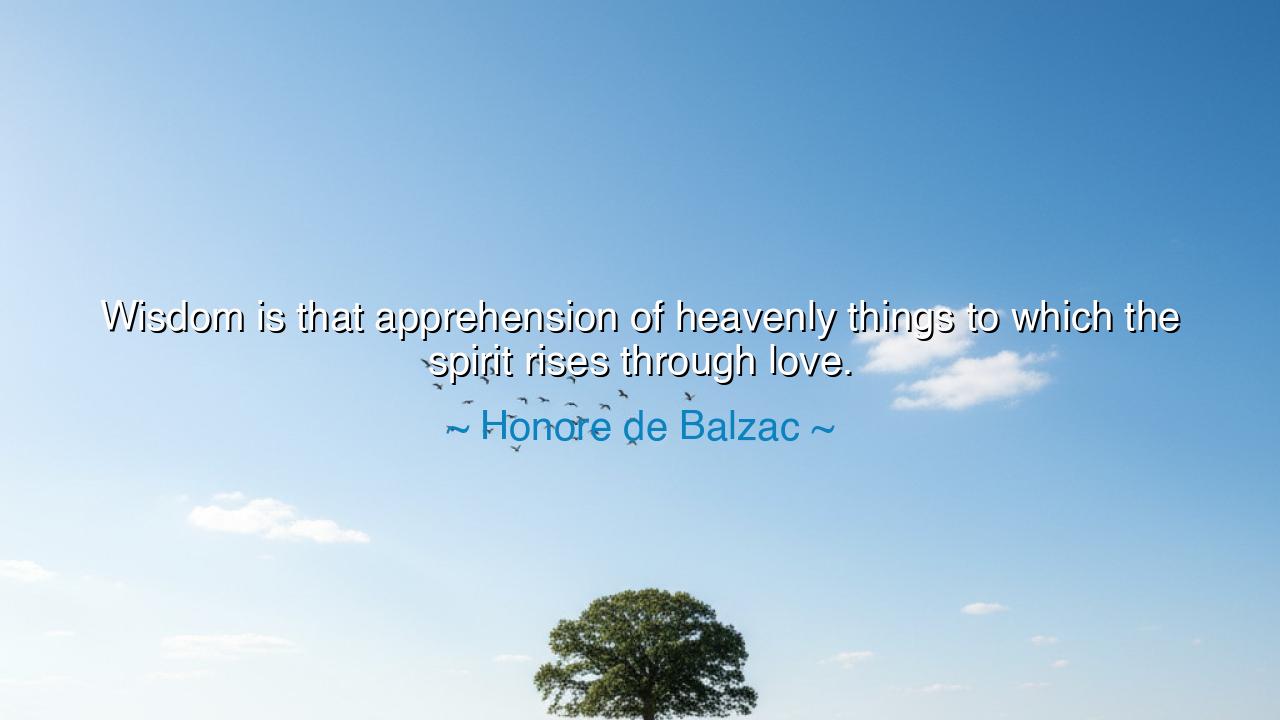
Wisdom is that apprehension of heavenly things to which the






Hearken, children of ages yet unborn, to the luminous words of Honoré de Balzac, who proclaimed: “Wisdom is that apprehension of heavenly things to which the spirit rises through love.” In these words lies the eternal truth of knowledge, spirit, and devotion: that true wisdom is not merely learned through study or reason, but is a sublime ascent of the soul, drawn upward by the force of love toward the divine and the eternal. It is the union of heart and intellect, where the spirit apprehends truths that transcend the material and the temporal.
Balzac teaches that wisdom is born of aspiration and affection, a longing for what is higher, purer, and eternal. Mere information or cunning does not suffice; it is the love for goodness, beauty, and truth that elevates the mind and spirit, allowing one to perceive the heavenly patterns underlying human existence. In this, we see that wisdom is sacred, a gift that arises when the heart and spirit act as guides to the intellect.
Consider the life of Saint Augustine, whose early years were marked by worldly pursuit and error. It was only through the transformative power of love—love for God, for truth, and for the human soul—that he ascended to profound understanding. In his writings, he reveals that wisdom is inseparable from devotion, that the apprehension of heavenly things emerges not from intellect alone, but from a spirit aflame with love and yearning for the eternal.
The ancients themselves held this principle as sacred. Plato and the mystics of the East taught that knowledge divorced from the heart is but shadow; it is through the stirring of the spirit, guided by compassion and reverence, that understanding attains its highest form. Balzac’s words echo this timeless insight: wisdom is the soul’s ascent, nurtured by love and illuminated by the divine light of truth.
Thus, his counsel is both inspiration and exhortation: let your pursuit of knowledge be joined to the movement of your heart, and let your deeds reflect the union of love and understanding. In doing so, the spirit rises beyond the mundane, perceiving the harmonies of existence and the sacred order of the cosmos. Wisdom, in this view, is both the reward and the fruit of a soul aligned with what is highest.
Carry this teaching, children of generations yet to come: cultivate love, elevate your spirit, and let your mind seek the heavenly and eternal. For wisdom is not the accumulation of facts alone, but the apprehension of the divine through the tender fire of the heart. In this ascent, the soul discovers truth, virtue, and the luminous joy of communion with the eternal.






Lla
This statement makes me think of how often people separate intellect from emotion, as though wisdom were purely cerebral. Balzac seems to reject that division, suggesting that love elevates the soul to perceive greater truths. I wonder if he believed that wisdom requires faith or spiritual sensitivity. Can a purely logical person ever reach that level of insight? Perhaps wisdom is not about knowing more, but about feeling and perceiving with purity of heart.
TAtuan anh
Reading this, I sense a profound connection between emotion and spirituality. It suggests that wisdom isn’t something achieved by effort but something awakened through love. But what kind of love is Balzac referring to—romantic, divine, or universal compassion? If wisdom depends on love, does that mean those who live cynically or fearfully are cut off from it? I’d like to explore whether this idea implies a moral responsibility to love deeply.
LLekhacquangminh
I find this perspective beautiful but also mysterious. If wisdom arises through love, does that mean it’s accessible to anyone capable of deep feeling, regardless of education or intelligence? It challenges the notion of wisdom as elitist or purely philosophical. Maybe Balzac is saying that to perceive what’s higher or eternal, one must approach life with an open heart rather than a clever mind. Is love the true path to enlightenment?
MVngo minh vu
This idea fascinates me because it ties wisdom not to intellect or experience, but to love. It makes me wonder whether true understanding is emotional rather than rational. Can someone be truly wise without compassion or empathy? Perhaps Balzac suggests that wisdom is more spiritual than analytical—a connection to something divine that only love can unlock. I’m curious how this view aligns with modern interpretations of wisdom as knowledge and discernment.